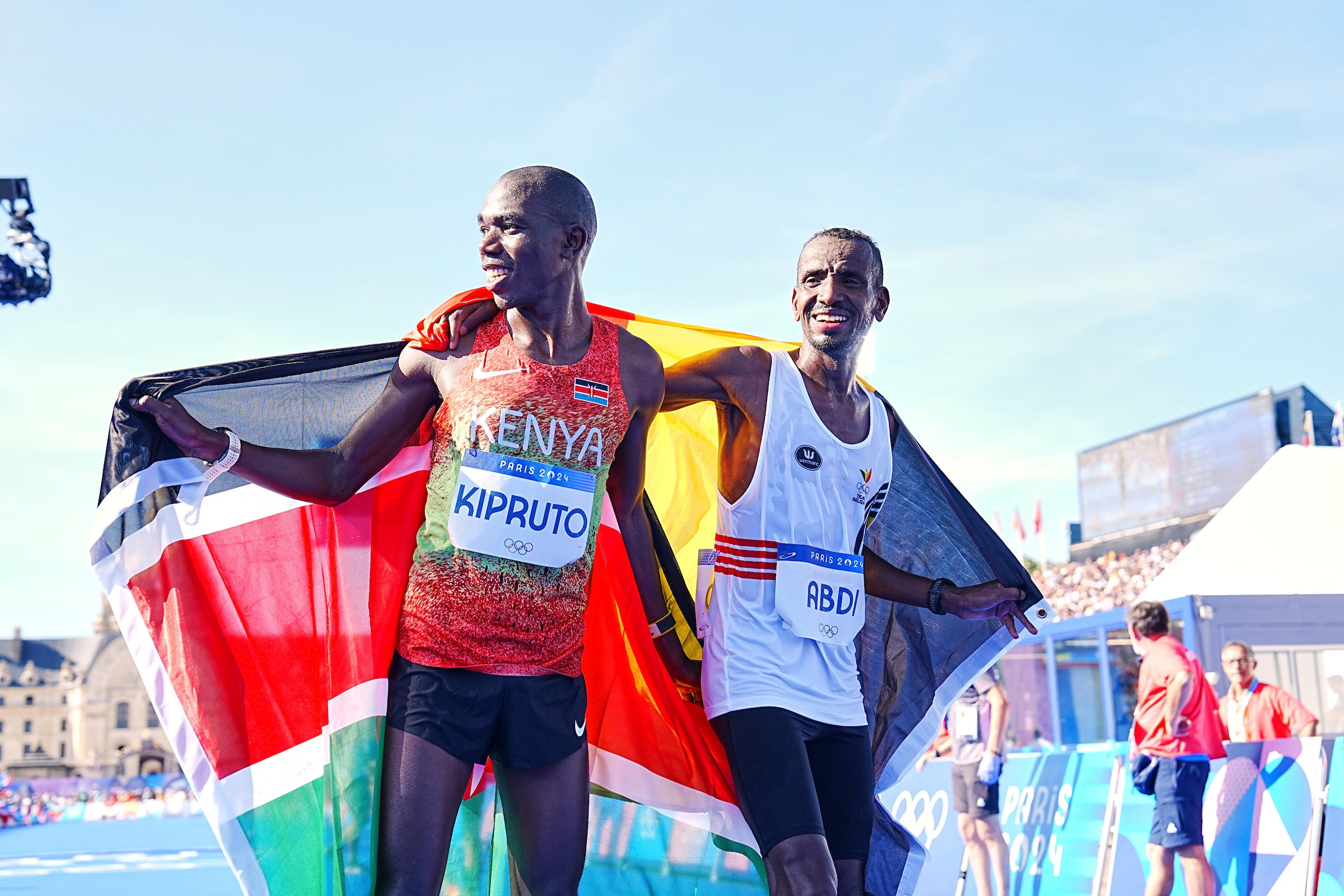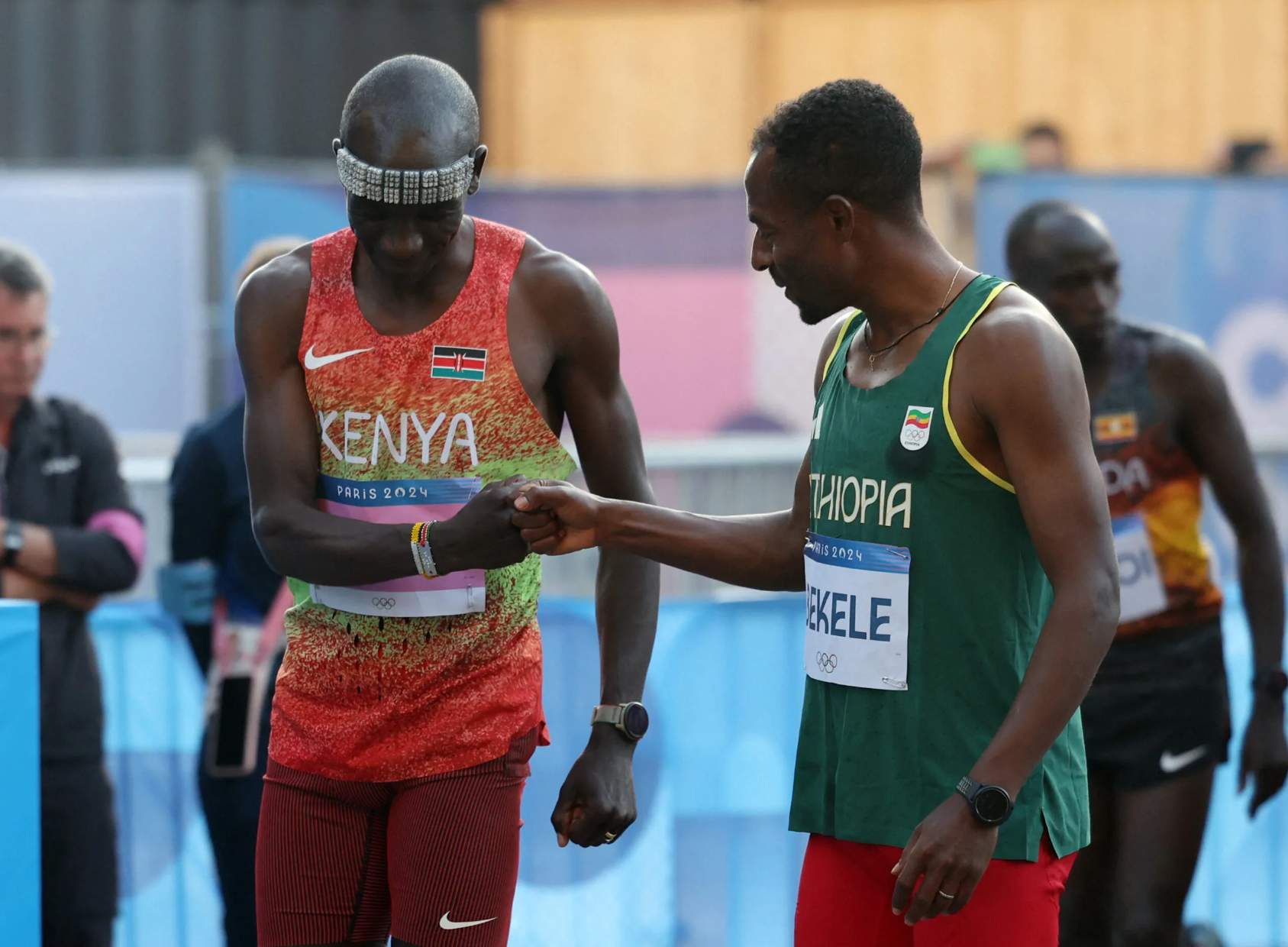My Five Favourite Races from Paris 2024: Part Two
Read part one here.
2. Men’s Marathon
Call me a romantic, for the marathon really does have my heart (I don’t know what romance is). It’s historic. It’s unforgiving. It’s unbeaten. In Paris, that first piece of advice that every budding marathon debutant hears – “respect the distance” – came into focus like never before in a moment so poetic that it’s now my iPhone lock screen.
But before I get into that, Tamirat Tola’s victory is absolutely worth talking about. After Sisay Lemma withdrew from the event a few weeks ago citing injury, Tola got the call-up to run in Paris. The former world champion did a stellar job, coming off the bench to win the whole thing and break the Olympic record on a course defined by its nasty hills. It was a nice moment of redemption for Ethiopia, with all three of the nation’s athletes finishing the race for the first time since 2008: their final standings of 1st, 5th, and 39th were certainly an improvement on their three DNFs from Tokyo. The occasion was made that much sweeter for the Ethiopians as double Olympic champion, former marathon world record holder, and Tola’s personal hero Haile Gebrselassie cheered his countryman over the line.
Tamirat Tola wins the 2024 men’s Olympic marathon
Next came Bashir Abdi, who upgraded his bronze from Tokyo to silver, with Kenya’s Benson Kipruto rounding out the podium in his first championship marathon. Kipruto dedicated his medal to Kelvin Kiptum, the current marathon world record holder and a man who would have probably won this race had he not died in a car crash earlier this year. Kiptum looked to be the heir-apparent to the Kenyan marathon running throne, but with his passing, and Kipruto’s 4-0 record against the aging Kipchoge, it appears that responsibility will now be passed to the Olympic bronze medallist. Heavy is the head.
Bashir Abdi (R) and Benson Kipruto (L) celebrate making the podium of the 2024 men’s Olympic marathon
Speaking of distance running royalty, Eliud Kipchoge, the greatest marathon runner of all time, and Kenenisa Bekele, the greatest distance runner of all time, had a tough day at the office. Kipchoge, who was bidding to become the first person to ever win three Olympic marathons, passed through halfway in 58th while massaging his lower back like any other 39-year-old man would. Unfortunately, the Kenyan was soon reduced to a walk before finally calling it a day to register the first DNF of his career. Up the road, a 42-year-old Bekele battled hamstring pain to the line, coming home in 39th to finish almost six minutes behind his victorious compatriot.
Father Time may be unbeaten, but this pair have put up a hell of a fight. It’s worth noting that neither has retired, so we will see them again on the global stage, but it is clear now that we are witnessing the dying embers of Bekele’s and Kipchoge’s incredible careers. Their stories may not be over, but there are no more grand chapters to write.
For two men who have done so much for this sport – who have bent every distance, including the marathon, to their will – this certainly doesn’t feel like a fitting way for them to go out. Yet perhaps it is. The brutality of the marathon is part of its charm, so much so that the first guy to run one straight up died (okay, that’s not strictly true, but that is how the tale of Pheidippides goes).
The marathon is a beautiful expression of the mental, physical, and spiritual capacity of humans, and few have done it better than Bekele and Kipchoge. In the end, that old saying rings true: running was the real winner of the day. As was Tola, I suppose.
Kenenisa Bekele and Eliud Kipchoge bump fists while waiting for the 2024 men’s Olympic marathon to begin
1. Women’s Marathon
Thank you, Paris, for saving the best until last. For the first time in Olympic history, the women’s marathon was the final event on the athletics schedule, and it had everything: records, tactics, monster hills, an iconic course, the highest of stakes, and a sprint finish between the two fastest marathoners in history. The lead pack changed many times throughout the race, with the likes of eventual medallists Hellen Obiri and Sifan Hassan drifting off the pace more than once. However, with 5km remaining, a tightly packed quintet had established themselves at the front, and it was clear that the podium would come from this group. With 400m to go, five became three, and as the medallists rounded the final corners, Hassan forced herself on Tigst Assefa’s inside and charged to the line to win her sixth medal in just two Olympics. Assefa, the world record holder, crossed the line for silver, with Obiri completing the podium despite falling over twice during the race and having to stop once to throw up.
Tigst Assefa (L), Sifan Hassan (M), and Hellen Obiri (R) receive their medals at the 2024 Olympic closing ceremony
Hassan has officially pulled off the greatest Olympic campaign we’ve ever seen from the modern distance runner. In less than a week, the Dutchwoman picked up a bronze medal in the 5000m and 10,000m and won the marathon. This is the second Olympics in a row that she has won three medals, having secured bronze in the 1500m in Tokyo and gold in the 5000m and 10,000m. She is the first woman to have won the 5000m, 10,000m, and marathon at an Olympic level and has established herself as a modern-day Zatopek.
In 1952, Emil Zatopek became the only person in history to win the 5000m, 10,000m, and marathon at the same Olympics. As impressive as this was, Hassan medalling in all three events in 2024, despite not winning two of them, is perhaps an even greater achievement. Not to take away from what Zatopek did, but in 1952, running was not seen as a legitimate career, East Africans were yet to be properly welcomed to the international stage, and large medal hauls were far more common simply because competition was much weaker. Fast-forward seven decades, and professional runners hail from all around the world, powered by scientific training methods and teams of medical professionals and coaches. The idea of someone even participating in Zatopek’s distance treble seemed far-fetched, never mind someone medalling in all three events. Hassan’s achievement in Paris is difficult to comprehend in isolation, but the fact that she did it against the backdrop of such a thrilling race made for something many distance running fans will never forget.
The men’s 10,000m was dramatic. The men’s 1500m was exciting. The men’s marathon was iconic. But the women’s marathon blended these elements in such an irresistible way that it can only be ranked number one on this list.
Sifan Hassan celebrates winning the 2024 women’s Olympic marathon






